- Home
- Clarice Lispector
The Passion According to GH Page 2
The Passion According to GH Read online
Page 2
Going to sleep is very much like the way that I now have of going to my freedom. Giving myself over to something I don't understand is placing myself on the brink of nothingness. It is going just by going, like a blindwoman lost in a field. That supernatural thing that is living. The living that I had tamed and made familiar. That courageous thing that is for me to give myself over and is like reaching out a hand to God's ghostly hand and entering that formless thing that is a paradise. A paradise that I don't want!
During the time I'm writing and speaking, I'm going to have to pretend that someone is holding my hand.
Oh, at least at the beginning . . . only at the beginning. As soon as I can do without it, I'll go on alone. In the meantime, I need to hold this hand of yours—even if I can't picture your face and your eyes and your mouth. But even though it is cut off from a body, this hand doesn't scare me. Its creation comes from an idea of love such that it is as if the hand were really attached to a body, and if I don't see it it's because I am unable to love more. I'm not up to picturing a whole person because I'm not a whole person myself. And how can I imagine a face if I don't know what kind of expression I need on it? As soon as I can get along without your warm hand, I'll go on alone—and in terror. That terror will be my responsibility until the metamorphosis is complete and the terror is transformed into clarity. Not the clarity born of a desire for beauty and morality like the kind I looked for before even without knowing it, but rather the natural clarity of what exists, and it is that natural clarity that terrifies me. Even though I know that the terror . . . the terror is only myself coming face to face with things.
In the meantime, I am inventing your presence, just as one day I shall also be unable to let myself die alone, dying is the greatest peril of all, I won't be able to pass over into death and put my first foot into my first self-absence— in that last and so first an hour too I shall invent your nameless presence and with you I shall start to die until I am able on my own not to exist, and then I'll let you go. For now, I have you, and your warm, unknown life is my only internal organization, I who without your hand would feel unattached within the enormous space that I have discovered. The space of truth?
But the fact is that truth has never made sense to me. Truth doesn't make sense! That's why I was afraid of it, and still am. Forsaken as I am, I give everything over to you—so you can do something pleasant with it. If I talk to you will I frighten you and lose you? but if I don't, I'll lose myself and in losing myself lose you anyhow.
Truth doesn't make sense, the hugeness of the world makes me shrink. What I probably asked for and finally found still ended up leaving me unprepared, like a child walking alone across the earth. So unprepared that only my love of all the universe could console me and satisfy me, only a love such that the very egg-cell of things would resonate with what I call love. With what in fact I am merely naming without knowing its name.
Could it have been love that I saw? But what kind of love is it that is as blind as an egg-cell? is that what it was? that terror, was it . . . love? a love so neutral that— no, I don't want to talk to myself anymore, to talk would be to precipitate a sense just like making yourself suddenly stable with the paralyzing security of that third leg. Or am I simply putting off starting to talk? why am I saying nothing and just playing for time? Because I'm afraid. I need courage to go forth with an attempt to concretize what I feel. It's as though I possessed a coin and didn't know what country it was good in.
I shall need courage to do what I'm going to do: to talk. And to run the risk of the enormous surprise that I am going to feel at the poverty of what I say. As soon as I say it, I'll have to add: "That isn't it, that isn't it at all!" But I'll also need not to be afraid of being foolish, I've always gone for the less rather than the more for fear of seeming foolish along the way: and also there's the wounding of one's dignity. I'm putting off the moment when I have to talk. Is it because I'm afraid?
And because I don't have a word to say.
I don't have a word to say. Why don't I just stay quiet, then? But if I don't force myself to talk, silence will forever engulf me in waves. Word and form will be the plank on top of which I shall float over billows of silence.
And if I keep putting off starting, it's also because I have no guide. Other travelers' accounts give me few facts about the trip: all their information is horribly incomplete.
I feel that an incipient freedom is gradually taking me over. . . . For never before today have I had so little fear of lacking good taste: I just wrote "billows of silence," which I wouldn't have said before because I have always respected beauty and its intrinsic decorum. I have said "billows of silence," my heart humbly bows, and I accept it. Have I in effect abandoned a whole system of good taste? But is that my only gain? How imprisoned I must have been that I feel myself freer just because I no longer fear a lack of aesthetics. ... I still don't foresee what else I may have gained. Maybe I'll learn of it little by little. For now, the first timid pleasure that I feel is being able to say that I have lost my fear of the ugly. And that loss is a very great good. It is a delight.
I want to know what more I've gained by losing. As of now, I don't know: only in reliving it will I experience it.
But how can I relive it? If I don't have a normal word to say. Shall I have to make words as though I were creating what happened to me?
I am going to create what happened to me. Only because living isn't tellable. Living isn't livable. I shall have to create upon life. And without lying. Yes to creation, no to lying. Creation isn't imagination, it's running the huge risk of coming face to face with reality. Understanding is a creation, it's my only way. I shall have to painstakingly translate telegraph signals—translate the unknown into a language that I don't know, and not even understand what the signals amount to. I shall speak in that sleep-walker's language that if I were awake wouldn't even be a language.
And I'll create the truth of what happened to me. Oh, it will be more a graphism than a writing, since I shall be engaging in reproduction rather than expression. I need to express myself less all the time. Have I lost that as well? No, even when I did sculpture I was only reproducing, and only with my hands.
Will I stay lost amid the silence of the signals? I will, for I know what I'm like: I never learned to look without needing more than just to see. I know that I'll terrify myself like someone who was blind and then finally opened her eyes and saw—but saw what? a mute, incomprehensible triangle. Couldn't that person consider herself blinder still for seeing only an incomprehensible triangle?
I ask myself: if I look into the darkness with a magnifying glass, will I see more than darkness? the glass won't disperse the darkness, it will only reveal it all the more. And if I look at brightness with a magnifying glass, I shall see, with a shock, only greater brightness. I have seen but am as blind as before because I saw an incomprehensible triangle. Unless I also transform myself into a triangle that will see in the incomprehensible triangle my own source and repetition.
I'm stalling. I know that everything I say is just to put it off— to put off the moment when I'll have to start talking, knowing that there is nothing more for me to say. I'm putting off my silence. Have I been putting off silence for my whole life? but now, in my disparagement of the word, perhaps I'll finally be able to start talking.
The telegraph signals. The world bristling with antennas, and here am I receiving the signal. I'll be able to do only a phonetic transcription. Three thousand years ago I lost my head, and all that was left were phonetic fragments of me. I'm blinder than before. I did see, I really did. And I was terrified by the raw truth of a world whose greatest horror is that it is so alive that for me to admit that I am as alive as it is—and my most hideous discovery is that I am as alive as it is—I shall have to raise my consciousness of life outside to so high a point that it would amount to a crime against my personal life.
For the profound morality that I felt before—my morality was the desire to understand, and
, since I didn't understand, I shuffled things around, that was only yesterday, and now that I discover that I have always been profoundly moral: I admit only of finality—as for my prior profound morality, for me to discover that I am as crudely alive as that bare light that I learned of yesterday, as for that morality of mine, the harsh glory of being alive is horror itself. I lived before of a humanized world; did the simply alive destroy the morality that I had then?
A world wholly alive has a Hellish power.
A world wholly alive has a Hellish power.
Yesterday morning—when I went out of the dining room to the maid's room—I had no way of knowing that I was but a step away from discovering an empire. Just a step away. My more primary struggle for more primary life was about to open with the calm, voracious ferocity of desert animals. I was about to confront within myself a degree of living so originary that it bordered on the inanimate. Nothing I was doing, however, gave any hint that I, my lips dry with thirst, was going to begin to exist.
It was only afterward that an old phrase would occur to me, one that years before I had foolishly engraved in my memory, just the subtitle of a magazine article that I ended up not reading: "Lost in the Fiery Hell of a Canyon a Woman Desperately Struggles for Life." I had no way of foreseeing where I was headed. But then I never was able to see how things were leaning; every time they reached a culmination, it always seemed to me to be a surprising rupture, an abrupt explosion, at a specific moment, and not the continuation of an uninterrupted flow.
That morning, before I went into the maid's room, what was I? I was what others had always seen me as, and that was the way I knew myself. I don't know how to explain what I was. But at least I want to remember: what was I doing?
It was almost ten in the morning, and it had been a long time since my apartment had been so much my own. The maid had quit the day before. The fact that there was no one talking or walking around and making something happen magnified with its silence this dwelling in which I live in my semiluxury. I was lingering at the coffee table— how hard it is becoming to know what I was like. But I have to make the effort to at least give myself a prior form, so I can understand what happened when I lost that form.
I was lingering over the coffee table, making little balls out of the center of the bread—is that right? I need to know, I need to know what I was like! This is how I was: I was distractedly making little, round balls out of the heart of the bread, and my last, tranquil, amorous liaison had dissolved amicably, with a caress, and I had again come into the happy and lightly insipid pleasure of freedom. Does that situate me? I am pleasant, I have sincere friendships, and my awareness of that gives me a gladsome friendship with myself that has never excluded a certain self-directed irony, albeit one that I don't push very far.
But . . . what that silence of mine was like before I don't know and have never discovered. Sometimes, while looking at a snapshot taken at the beach or at a party, I would notice, with a slight, ironic apprehension, what that smiling, dimmed face showed about me: a silence. A silence and a destiny that were escaping me, me a hieroglyphic fragment of an empire living or dead. Looking at the picture I could see the mystery. No. I'm going to lose the rest of my fear of bad taste, I'm going to start my exercise in courage, living isn't courage, knowing that you're living, that's courage—and I swear that in the photograph of me I could see the Mystery. I would be taken slightly by surprise, it's only now that I am discovering that it was a surprise: in those smiling eyes there was a silence such as I have seen only in lakes and heard only in silence itself.
Never, then, did I have reason to think that one day I would go to encounter that silence. To encounter the splintering of silence. I would take a quick glance at the face in the photograph and, for a second, in that inexpressive face the world would look equally inexpressively back at me. Was that—just that—my closest contact with myself? the greatest silent sounding I have attained, my blindest, most direct link with the world. The rest . . . the rest amounted to various organizations of myself, I know that now, oh now I know. The rest was how I had transformed myself little by little into the person who bears my name. And I ended up being my name. All you need to do is see the initials G. H. in the leather of my luggage to know that that's me. And I have never demanded of anyone else anything more than the mere coverage of the initials of their names. What is more, "psychology" has never held any interest for me. I used to become impatient, and still do, with the psychological attitude; it's an instrument that simply transcends. I think I left the psychological stage behind with adolescence.
G. H. had lived a great deal, that is, had experienced many facts. Have I somehow perhaps been in a hurry to experience everything I would have to experience as soon as possible, so that I would have extra time to ... to live without facts? to live. Did I early on discharge all my sense duties—early and quickly experience pains and pleasures—to get free all the sooner of my lesser human destiny? to get free so that I could seek my tragedy.
My tragedy lay somewhere. Where was my greater destiny? one that wasn't just the plot of my life. The tragedy—which is the greater adventure—had never taken place in me. My personal destiny was all I knew. And all I wanted to know.
I spread about me a tranquility that comes from my having reached a certain degree of realization about what it means to be G. H., even on luggage. Also, without reflection, I have adopted my reputation for my so-called inner life: I treat myself as others treat me, I am what others see in me. When I was alone there was no fall-off, there was merely one degree less of what I was like with the others, and that was always my naturalness and my health. And my brand of beauty. Was it only my photographs that pictured an abyss? an abyss.
An abyss of nothingness. Just that huge, empty thing: abyss.
I act like what is referred to as a finished person. Intermittent sculpting over an indeterminate period of time also gave me a past and a present that allowed others to situate me: they allude to me as someone who does sculptures that wouldn't be bad if they were less amateurish. For a woman, that reputation is a great thing socially and it has located me, as much for myself as for others, in an area between man and woman, socially speaking. Which left me much freer to be a woman, since I was making no formal effort to be one.
As regards my so-called inner life, perhaps it was the sporadic sculpting that has given it a slight tone of pre-climax—perhaps because of that certain kind of attentiveness that even dilettantish art brings with it. Or because I have had the experience of patiently clearing away material to find gradually its immanent sculpture; or because, again from the sculpture, I have suffered the enforced objectivity of struggling with something that was other than myself.
All this has given me the slight tone of preclimax characteristic of someone who knows that, if I listen attentively to objects, something of those objects will come forth and be imparted to me that will then in turn be given back to the objects. Maybe it was that tone of preclimax that I saw in the smiling, ghostly photograph of a face whose voice is an inexpressive silence, all people's pictures are portraits of the Mona Lisa.
And is that all I can say about myself? That I'm "sincere"? I am, more or less. I don't lie to conjure up false truths. But I have used truths as a pretext too much. Truth as a pretext for lying? I could just tell myself things that flattered me and then tell the underside. But I have to be careful not to confuse defects with truths. I am afraid of what being sincere would lead me to: to my so-called nobility, which I pass over, to my so-called vulgarity, with which I do likewise. The more sincere I might become, the more I'll be led to flatter myself, both with my occasional nobilities and especially with my occasional vulgarity. The only thing sincerity doesn't lead me to do is pride myself on my inconsequentiality. That I leave out altogether and not just for lack of self-pardon, I who have pardoned every great and important thing in myself. Inconsequentiality I omit because confession is often a point of vanity for me, even painful confession.
&nb
sp; It isn't that I want to be pure of vanity, but I need to clear myself from the field to be able to move in it. If I can move. Or is wanting not to be subject to vanity the worst form of vanity itself? No, I think I just need to be able to look without having the color of my eyes matter. I need to get rid of myself to be able to see.
And is that all I was? When I open my door to unexpected visitors, what I glimpse in the faces of the people who see me at the door is that they have just glimpsed in me my tender preclimax. What the others get from me is, then, reflected back to form the atmosphere of what is called "me." That preclimax may have been my whole existence up to now. The other—anonymous and unknown— that other existence of mine that was merely profound was what probably gave me the sense of security of a person who always has the kettle on a low flame in the kitchen: whatever occasion might arise, I'd always have water boiling.
Only the water had never boiled. I didn't need violence, I just bubbled about enough to keep the water from ever boiling and overflowing. No, I haven't known violence. I was born without a mission, my nature didn't impart one to me; and I have always had a light enough hand not to impress a role upon myself. I didn't give myself a role, but I did organize myself for the purposes of my own understanding. I couldn't put up with not finding myself in the catalog. My question, if I had one, wasn't "what am I?" but rather "among whom am I?" My cycle was complete: what I was experiencing in the present had already been conditioned in such a way that I could understand myself as a result. An eye looked over my life. I probably called that eye sometimes "truth," sometimes morality, sometimes human law, sometimes "God," sometimes "myself." For the most part I lived inside a mirror. Two minutes after I was born I had already lost my beginnings.

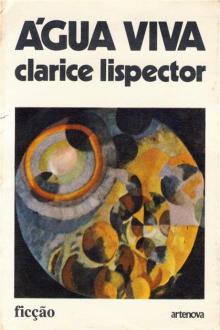 The Stream of Life
The Stream of Life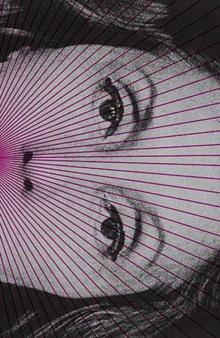 The Complete Stories
The Complete Stories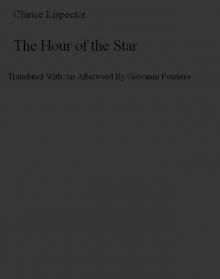 The Hour of the Star
The Hour of the Star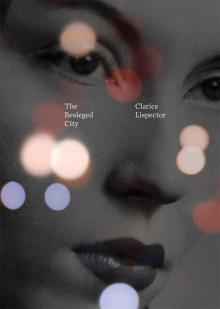 The Besieged City
The Besieged City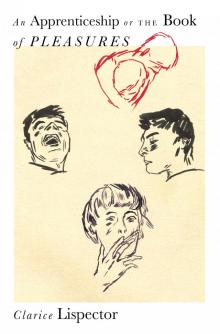 An Apprenticeship or the Book of Pleasures
An Apprenticeship or the Book of Pleasures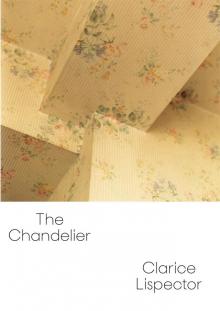 The Chandelier
The Chandelier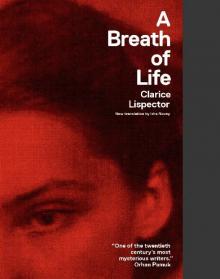 A Breath of Life
A Breath of Life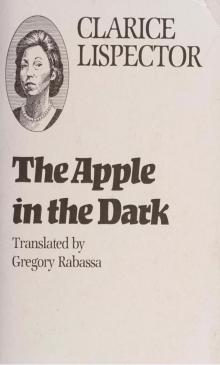 The Apple in the Dark
The Apple in the Dark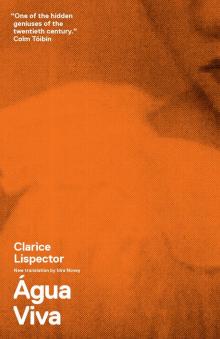 Agua Viva
Agua Viva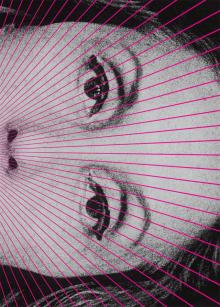 Complete Stories
Complete Stories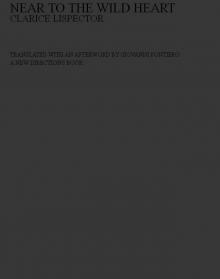 Near to the Wild Heart
Near to the Wild Heart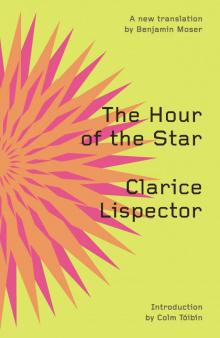 The Hour of the Star ()
The Hour of the Star ()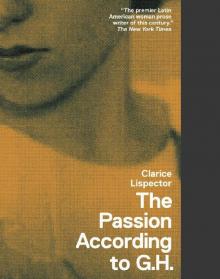 The Passion According to G.H.
The Passion According to G.H.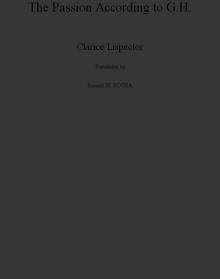 The Passion According to GH
The Passion According to GH